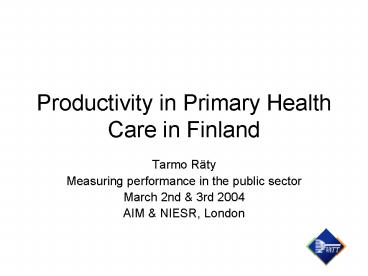Productivity in Primary Health Care in Finland - PowerPoint PPT Presentation
1 / 15
Title:
Productivity in Primary Health Care in Finland
Description:
Responsibility for arranging health care devolved to municipalities. ... Physiotherapy. Mental care. A Health Centre (about 265 units) Descriptive data ... – PowerPoint PPT presentation
Number of Views:33
Avg rating:3.0/5.0
Title: Productivity in Primary Health Care in Finland
1
Productivity in Primary Health Care in Finland
- Tarmo Räty
- Measuring performance in the public sector
- March 2nd 3rd 2004
- AIM NIESR, London
2
Distinctive features of Finnish health care system
- A large sparsely populated country. Average
population density 16/km2 - Responsibility for arranging health care devolved
to municipalities. Average size 11000, median
5000 - Health centre network main provider of primary
health care. Organised mainly on municipal level. - Specialised care, 20 hospital districts in which
municipalities are obliged to belong. - National health insurance reimburses private
medical care and pharmaceuticals.
3
Finance and Provision of Public Health Care Net
Payments, million euros, 2002
Private providers
National health insurance
Central Government
Ministry of Social Affairs and Health
307
Block grants and ear marked support 1600 me
Municipal income tax (proportional)
State income tax (progressive)
Municipal Councils
2235
3180
net operation cost
Hospitals
Health centres (primary care)
348
275
220
user charges
Population
Pharmacy
859
Patients
765
To the national health insurance 1082
4
Finance and Provision of Public Health Care Net
Payments, Relative Shares
National health insurance
47
43
5
Funding Arrangements, All the expenditures on
health
6
Health care net expenditure 2001 and population
density21 sub-regions
1 200
1 150
1 100
Per capita expenses,
1 050
1 000
950
900
0
10
20
30
40
50
Population/km2
7
Primary Care in Finland
A Health Centre (about 265 units)
GP reception
Inpatient ward
Dental care
Other
Schools
By appointment
Long term
Maternity clinics
On duty
Short term
Child health care
Home nursing
Physiotherapy
Mental care
- Usually a health centre also runs its own
laboratory and X-ray services
8
Descriptive data inputs, prices and outputs
9
Performance II Productivity in Primary Health
Care 1988-2001
10
Outcomes or outputs?
- Theoretically, we should use outcomes instead of
outputs, but the reality fights back - In primary care we do not know the alternative
cost of not giving care - We do not know what is enough care, unlike in
special care. - No general index of health conditional to given
primary care alone exists - However
- We can hope that decision makers allocate the
resources such that the optimal mix of outputs
for the health will be produced.
11
The models for productivity
Large number of similar units
Favours nonparametric DEA measure
Large number of outputs
Dont know value of outputs
- Further analysis
- Tobit analysis to explain differences in
inefficiency - Managerial efficiency to adjust inputs taking
account unfavourable environment (Fried, Schmidt
and Yaisawarng (1999). Journal of Productivity
Analysis 12(3) 249-267.
12
Taking account quality I
Alternative interpretations of quality
Physical environment (resources)
Efficient care (professional criterion)
Client satisfaction
-Rural units has to produce more demanding
outputs -Unfavourable demography -In the course
of time the needs will change.
-Minimise the number of visits for a episode
-Maximize the number of care episodes in a
unit
-Easy and quick access on services -Short episode
For the primary care data not available
Managerial efficiency method fixes some of the
variation
13
Taking account quality II
Traditional productivity index methods
- The weights can be
- Prices
- Valuations
- Fair evaluations
Cost accounting already produces some estimates
on relative prices, but -not by units -not
in uniform way -not regularly Under my
knowledge, there are no plans for collecting
unified and regular price info.
However, together with Statistics Finland, we are
currently constructing a total factor
productivity index for the primary care. This
will be consistent with output indicator set for
primary care to be used in SNA.
Ministry of Finance will most likely to use the
same set of indicators, but the set of weights is
still unknown
14
Problem areas and future challenges
- rapid ageing of the Finnish population
- pay pressures of health care personnel
- co-ordination of primary and specialised health
care - how to secure health services provision in
sparsely populated small municipalities
15
Appendix Managerial efficiency
Incorporating operating environment into
DEA Stage I Initial input oriented DEA model
with constant returns to scale. Stage II
Quantifying effects of operating environment.
For each input in turn Radial nonradial input
slacks are regressed against environmental
variables Stage III Data adjustment Fitted
values are used to bring all the input usage to
the same line with respect to regressors
adjusted input observed max(fitted values)
-fit Stage IV DEA on adjusted data














![NOTE: To appreciate this presentation [and insure that it is not a mess], you need Microsoft fonts: PowerPoint PPT Presentation](https://s3.amazonaws.com/images.powershow.com/7010443.th0.jpg?_=20150809053)
















